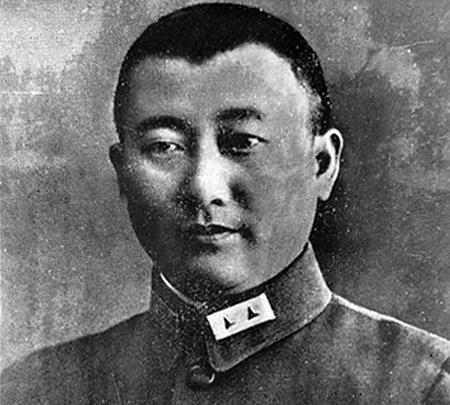On March 1, 1948, Hu Zongnan, the "King of the Northwest", received a telegram from the front line with only one sentence:
"Defeat is over, determined to shed the last drop of blood!"
The person who sent the telegram was Liu Jie, commander of the 29th Army. Two days later, Liu Jie committed suicide.

Among the generals of the Kuomintang army, Liu Jie was a fierce general with a large number, Huangpu was born in huangpu and started in the Northern Expedition, and was deeply respected by Chiang Kai-shek, and after he committed suicide, Chiang Kai-shek scolded Hu Zongnan for his poor command, and even asked him to apologize for his death and bury Liu Jie.
Of course, this is just Chiang Kai-shek's angry words, but it is enough to explain Liu Jie's position in his heart.
As early as 1933, after the outbreak of the Great Wall War, Liu Jie personally led the 83rd Division to the battlefield and launched a life-and-death duel with the Japanese Kou. Although Liu Jie's troops were very strong in combat, they suffered from isolation and insufficient strength, and the 83rd Division suffered heavy casualties in the fight with the Japanese Kou.
How tragic is it? Even the kitchen men and hygienists were chased to the front by Liu Jie.
Seeing that the position was about to be unable to be defended, Liu Jie was indignant and simply pulled out his pistol and prepared to commit suicide, but was forcibly stopped by his subordinates. It is not difficult to see from here that Liu Jie attaches great importance to victory and defeat in his bones, and he will commit suicide if he loses the battle. This personality was also the key reason for his later tragic fate.
After the outbreak of the All-out War of Resistance, Liu Jie even found the opportunity to kill the enemy and serve the country, and fought many good battles, which made the Japanese Kou feel frightened. Taking the Battle of Xinkou as an example, Liu Jie led his troops in a bloody battle with the Japanese army, killing and wounding tens of thousands of enemy troops, creating an unprecedented victory since the War of Resistance Against Japanese Aggression.
Now to bring the topic back to the beginning, how did Liu Jie fall under siege by the People's Liberation Army?
It turned out that in late February 1948, Mr. Peng led an army to raid Yichuan, a major area in Guanzhong, and considering the importance of Yichuan's strategic location, Hu Zongnan urgently dispatched Liu Jie to the rescue. But Hu Zongnan did not expect that at the moment when he sent reinforcements, Mr. Peng had already changed his strategic purpose from siege to reinforcement, vowing to eat Liu Jie's 29th Army, so on Liu Jie's way to Yichuan, he formed a siege against him.
However, Liu Jie was also a veteran of the battlefield after all, and soon realized that the situation was not right, so he ordered a local defense, ready to remove the threat of the two wings before advancing, so as not to fall into the situation of being surrounded.
However, at this moment, Hu Zongnan, who was obsessed with Yichuan, did not listen to his advice at all and ordered him to continue to advance. In desperation, Liu Jie could only hold the attitude of taking one step at a time and continuing to rush to the aid of Yichuan.
As a result, just as Liu Jie reached the area of Wazi Street, he completely penetrated the encirclement of the People's Liberation Army. Soon, Liu Jie was completely defeated by the PLA's "interspersed division" tactic, so there was a brief telegram at the beginning.
Since the defeat had been decided, Liu Jie, who had always had a heavy sense of self-esteem, did not want to be a prisoner, but actually pulled a grenade and committed suicide.
Liu Jie's bloodiness made Mr. Peng also feel respect, and said to Zhang Zongxun:
"Liu Jie, this boy is still a bit backbone, not greedy and afraid of death, did not embarrass the Hunan people, is a good man!" Although Liu Jie was reactionary, he still made meritorious contributions to the anti-Japanese resistance, wrapped up the body, and Yan Ming, and returned it to Hu Zongnan. The officials had become lieutenant generals, and let Hu Zongnan give them a memorial service. ”
After Liu Jie's coffin was delivered to Hu Zongnan's station, Hu Zongnan caressed the coffin and cried bitterly, if it were not for his stubbornness, perhaps this loving general would not have ended up like this.
After hearing this news, Chiang Kai-shek was even more distressed, scolding Hu Zongnan for his ineffective command, and even asked him to apologize for his sins with death and bury Liu Jie. Fortunately, after everyone urged him, Chiang Kai-shek withdrew this order. After all, for him, Hu Zongnan was more important than Liu Jie.
In order to commemorate this beloved general, Chiang Kai-shek posthumously promoted Liu Jie to the rank of second-class general in the army. Moreover, in 1953, Chiang Kai-shek once again promoted Liu Jie to the rank of second-class general.
The promotion of the general twice is probably unique among all the senior Kuomintang generals.